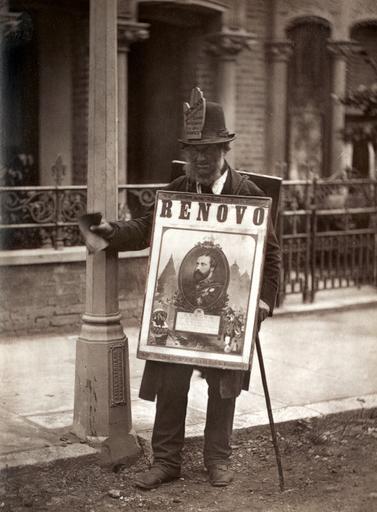MAKE A MEME
View Large Image

| View Original: | London_Boardmen.jpg (1983x2696) | |||
| Download: | Original | Medium | Small | Thumb |
| Courtesy of: | www.flickr.com | More Like This | ||
| Keywords: street_life_in_london streetlifeinlondon boardman boardmen advertising sandwich board sandwichboard From 'Street Life in London', 1877, by John Thomson and Adolphe Smith: “I had, for instance, an occasion of discussing with two boardmen who seemed worthy of a better position. The first had been trained as a smith, and engaged in the making of iron bedsteads. Now, however, smiths are no longer employed for this sort of work. It has been found more expedient and economical to make bedsteads with cast iron, and this change in the mode of manufacture threw many men out of employment, and notably my informant, who gradually sank to that state of misery when street life becomes the only means of existence. The other board man with whom I conversed was an old soldier, and had served nine years in the East Indies. He had shared in many glorious engagements, and was proud to relate that he had fought in Major-General Havelock's division at the relief of Lucknow. Probably his position in life would have been secured had he only received a good education; but he was not well enough read to occupy the post or undertake the business his friends were willing to offer him. He consequently dwindled down till he reached that point in life when anything that brings a few pence is heartily welcome. But the old soldier has still retained considerable energy. He is not content with carrying the boards during the day, but also seeks to make use of his evenings. He has, fortunately, often obtained a shilling a night at the Globe Theatre where he appeared as a supernumerary.” For the full story, and other photographs and commentaries, follow this link and click through to the PDF file at the bottom of the description archives.lse.ac.uk/Record.aspx?src=CalmView.Catalog&i... From 'Street Life in London', 1877, by John Thomson and Adolphe Smith: “I had, for instance, an occasion of discussing with two boardmen who seemed worthy of a better position. The first had been trained as a smith, and engaged in the making of iron bedsteads. Now, however, smiths are no longer employed for this sort of work. It has been found more expedient and economical to make bedsteads with cast iron, and this change in the mode of manufacture threw many men out of employment, and notably my informant, who gradually sank to that state of misery when street life becomes the only means of existence. The other board man with whom I conversed was an old soldier, and had served nine years in the East Indies. He had shared in many glorious engagements, and was proud to relate that he had fought in Major-General Havelock's division at the relief of Lucknow. Probably his position in life would have been secured had he only received a good education; but he was not well enough read to occupy the post or undertake the business his friends were willing to offer him. He consequently dwindled down till he reached that point in life when anything that brings a few pence is heartily welcome. But the old soldier has still retained considerable energy. He is not content with carrying the boards during the day, but also seeks to make use of his evenings. He has, fortunately, often obtained a shilling a night at the Globe Theatre where he appeared as a supernumerary.” For the full story, and other photographs and commentaries, follow this link and click through to the PDF file at the bottom of the description archives.lse.ac.uk/Record.aspx?src=CalmView.Catalog&i... | ||||